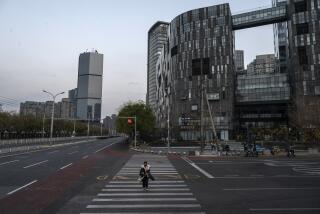China’s Great Leap Backward--to Confucius
- Share via
XIWENGZHUANG, China — The children sit ramrod straight at their desks, hands clasped behind their backs as, on teacher’s cue, they shout their lesson in unison:
“A young man should serve his parents at home and be respectful to elders outside his home!”
The words are 2,500 years old; the author is Confucius, China’s greatest philosopher, who is making a comeback from the communist junkyard despite originating in an era when silk-robed scholars served China’s emperors.
But these junior high students are the children of modern rulers--Communist Party officials and businessmen. And the setting, the Shengtao Experimental School in the mountains two hours north of Beijing, is the new wave in Chinese education.
Confucianism was discarded more than 50 years ago as medieval, oppressive and unfit for the new communist order. Its revival, experts say, reflects growing ethnic pride, as well as fear that rising incomes are making Chinese too materialistic.
“China is struggling to fill a moral and ethical void. That’s the price we have to pay for a modern economy and country,” said Meng Fanhua, a specialist on contemporary culture at the China Academy of Social Sciences.
Confucius--or Kongfuzi in Chinese--taught in his “Analects” that a peaceful and prosperous society was possible if everyone from pauper to prince adhered to the same virtues of honesty, courtesy and loyalty. A schoolteacher, author and government advisor, he died in 479 B.C., but his philosophy thrived. For more than two millennia afterward, his ethics guided all aspects of Chinese life, from rearing children to ruling empires.
But as China lagged behind the West, the ancient moral code was attacked as a shackle on progress. After 1949, the communists reviled Confucius as an enemy of the people.
No longer. Since the late 1990s, Beijing has allowed hundreds of public schools to offer classes in Confucianism, experts say. That’s not much in a country of 1.3 billion people, and while most of the schools are free, Shengtao school charges the equivalent of $2,000 a year, three times China’s urban annual income per person. So enrollment is limited to wealthy families.
Still, the very existence of Confucian studies reflects a new tolerance on the part of the Communist Party.
The leadership is turning increasingly to ethnic identity and away from leftist ideology to justify its own rule. The Confucian virtue of loyalty to a ruler also has a clear appeal for the authoritarian regime.
“Strengthen moral-building for little citizens,” Chinese President Jiang Zemin said in a June 4 speech backing a national program to increase ethical education in schools, according to the official Xinhua News Agency.
Almost 2 million students have already taken classes in Confucian morality, said Guo Qijia, deputy director of the China Confucius Society.
And demand keeps rising. The society--itself backed by the Ministry of Education--gets queries almost every day from schools that want to add courses in Confucian ethics, Guo said.
Guo said Confucianism’s message resonates in a society that is looking for a moral compass after first abandoning traditional values for radical Marxism, then Marxism for market-oriented reforms.
Educators also say parents are increasingly interested in instilling ethnic pride in their children. Liu Yinfang, the matronly 55-year-old principal of Shengtao School, said the school teaches youth to cherish China’s own cultural achievements rather than mimicking those of foreigners.
“We have 5,000 years of history,” she said. “Why do we keep relying on foreign cultures?”
In Shengtao’s schoolyard, boys in blue uniforms and girls in pink cried “Huh! Huh!” as they practiced kung fu kicks, punches and blocks. The sound of an “erhu,” a traditional Chinese stringed instrument, drifted from one classroom. In another room, students guided black brushes over white rice paper in calligraphy exercises.
Experts say Shengtao, which Liu helped found four years ago, is the only school in China to devote its curriculum almost entirely to Confucianism and other traditional subjects.
Teaching methods are old-fashioned as well. Writings by Confucius and other ancient Chinese philosophers are memorized and recited, often without any explanation by teachers.
But in a concession to the 21st century, Shengtao does have a lab full of new computers. English is also taught--using translations of Confucian texts and traditional Chinese poems.
“We’re taught ethnicity comes first, the world second. Young people must know more about Chinese culture,” said Gao Xinwo, a 14-year-old girl in eighth grade.
Liu said the school’s elementary and junior high students come from all over China. There are only 56 students, but Liu said interest is growing so rapidly that new buildings will soon be added to house a high school.
But she also conceded that the school’s draw will remain limited. Most Chinese parents, she said, want their children to learn skills more valued in the world marketplace--computer languages, English, accounting.
Experts agree.
“It’s unrealistic to think Confucius could defeat McDonald’s, the NBA and Hollywood movies,” said Meng, the culture expert. “We really can’t go back. We have to keep moving ahead.”
More to Read
Sign up for Essential California
The most important California stories and recommendations in your inbox every morning.
You may occasionally receive promotional content from the Los Angeles Times.













